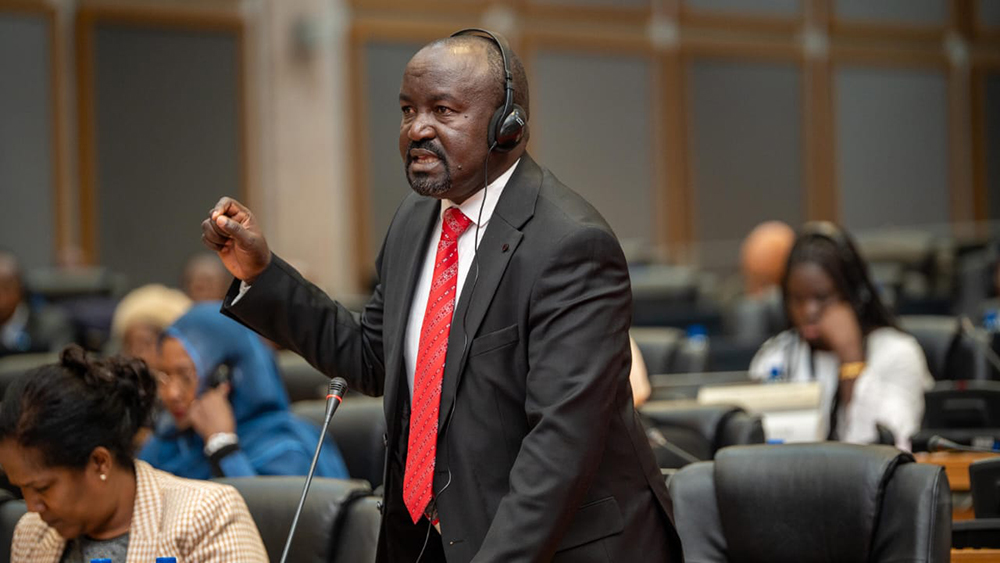African lawmakers demand reparations for slavery, colonial crimes
During a meeting held in Midrand, South Africa, on July 23, 2025, African legislators made a unified call for reparations from former colonial powers, demanding justice for slavery, colonialism and decades of economic exploitation.
Kassanda North MP Patrick Oshabe Nsamba debating in the Pan African Parliament. (Parliament press unit)
In his bestselling novel, which was later turned into a TV miniseries Roots: The Saga of an American Family, African-American novelist Alex Haley portrays the first 17 years of protagonist Kunta Kinte, a black slave forcibly extracted from the Gambia as being marked by relentless hardship and profound alienation.
"He was thirty-four years old! What in the name of Allah had become of his life? He had spent as many years in the white man’s land as he had in Juffure. Was he still an African, or had he become a ‘nigger,’ as the others reluctantly called themselves? Was he even a man?”
“At the age his father had last seen him, he had no sons, no wife, no family, no village, no people, no homeland, almost no past that felt real to him anymore, and no future he could envision. The Gambia felt like a distant dream, or perhaps a slumber from which he had yet to awaken. And if asleep, would he ever rise?" Haley adds.
And yet, Kunta’s tragic odyssey was just part of a broader statistic. Historians estimate that some 12.5 million souls were torn from African shores, forced aboard slave ships and subjected to the nightmare of the Middle Passage. With 1.8 million perishing in the course of the journey.
In the process, families were shattered and Africa’s energetic crops were lost. Despite their vital role in building economies of the West and new-found lands, slaves and their descendants were rewarded with deep-rooted racism that still runs to this day.
Pan-African Parliament
However, during a meeting held in Midrand, South Africa, on July 23, 2025, African legislators made a unified call for reparations from former colonial powers, demanding justice for slavery, colonialism and decades of economic exploitation.
Speaking during the 5th Ordinary Session of the Pan-African Parliament (PAP), members urged Western nations to acknowledge the historical injustices committed against the African people and offer compensation through financial reparations, return of looted artefacts, and legal redress.
Sulayman Saho from The Gambia described the trans-Atlantic slave trade as a “holocaust,” stating that it led to the deaths of millions of Africans and disrupted the continent’s development and dignity.
“In addition to paying reparations, the looted resources that were taken to England must be returned, and there should be a court system to start the trials,” he said. He praised the government of Benin for securing the return of stolen artefacts, calling it a model for other nations.
Kenyan Senator Danson Mungatana called for litigation to compel reparations. He cited the 2019 case filed by five Mau Mau veterans in Britain, which highlighted sexual violence against women and children, loss of property, and other atrocities during the colonial era.
“In Namibia, the Herero community also went to court, claiming that 80,000 of their people were killed by German colonisers,” he added.
Mungatana urged the Pan African Parliament to adopt a collective position to encourage court actions. He said only legal processes can force reparations to happen in Africa.
Mamello Phoko of Lesotho questioned how Africans can reclaim their cultural identity in the wake of colonial destruction.
“We are lost in the culture of the people who colonised us,” she said. “Everything that was taken from Africans must be given back. Whatever you took from a man, you have to return it.”
Ugandan MP Nsamba Patrick emphasised that reparations are not a request but a right. “Reparations are not a favour. They are a legal and moral right that African people must demand.”
Kassanda North MP Patrick Oshabe Nsamba
Nsamba urged the PAP to define the key injustices and calculate their economic value. “We must know the cost of the slave trade and the injustices so that when we talk about reparations, we know what must be refunded,” he argued.
However, he also warned against hypocrisy among African leaders. “We cannot demand reparations for colonial injustices while we continue to abuse our own citizens. Many African leaders abduct, imprison, and even kill opponents. That undermines our moral authority,” he said. He further criticised corruption and misuse of aid.
“Multinationals are exploiting us because of the corruption of our leaders. They send money to build roads, but it ends up in the pockets of those who lead us,” he said.
The Pan African Parliament is sitting from 21st to 31st July 2025 under the African Union theme of the year 2025: “Justice for Africans and Persons of African Descent Through Reparations.”
Uganda’s delegation to the Pan African Parliament includes Hon. Patrick Oshabe Nsamba (Kassanda County North), Hon. Felix Okot Ogong (Dokolo South County), Hon. Achayo Juliet Lodou (Ngora County), Hon. Abdu Katuntu (Bugweri County) and Hon. Kamusiime Caroline, (District Woman Representative, Rukiga).
UK Foreign Secretary's take
The subject of reparations remains deeply contentious in the West. Last year in October, 56 Commonwealth leaders as they ended their weeklong summit in Samoa, signed a statement saying the time had come for a conversation about reparations.
In an interview aired by the BBC a week later, UK Foreign Secretary David Lammy, himself a descendant of enslaved people, acknowledged the long-overdue reckoning.
However, he cunningly attempted to reframe the conversation.
“It’s not about a transfer of cash. I think that is not the debate people want to have. They want to talk about the future," Lammy said.
"It’s about partnerships, working together, climate finance, tech and creativity,” he added.